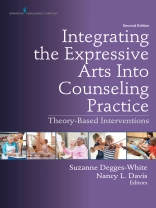‘When I used it, I felt it was a very valuable resource, linking work with the arts to the theoretical foundations of counseling.’–Sally S. Atkins, Ed D Professor Emerita Founding Director of Expressive Arts, Appalachian State
‘They [Students] like the activities since it helps them learn more about the counseling theory which was discussed in the Theories of Counseling class. It provides more application. Some activities are pretty detailed and class time does not allow for much practice. But, we discuss how this could be used in therapy sessions/groups… [The book] is short and very pointed in its information and use. We like it!’–Judy A. Schmidt, Ed D, CRC, LPCA University of North Carolina at Chapel Hill
Expanded and revised to reflect a broader understanding of the complementary approach to therapeutic treatment, this is the only text to integrate expressive arts counseling techniques with major theories of counseling and psychology. Substantial changes to the second edition include new chapters that address Neuroscience and Counseling, Trauma-Informed Counseling, Animal-Assisted Therapy, Mindfulness and Counseling, and Family Counseling, along with a greater emphasis on cultural and diversity considerations throughout. The book is updated with over 30 new interventions including animal-assisted and videographic interventions, and new information about the neuroscientific foundations of expressive arts therapies. Updated references in each chapter, and a suite of Instructor’s Materials also add to value of the second edition.
The text integrates expressive arts therapies with 12 commonly used treatment modalities. Each chapter reviews a particular theory and describes how expressive and creative techniques can support and be easily integrated within that orientation. Over 90 field-tested, step-by-step interventions—created by leading practitioners—offer students and clinicians techniques that can be put to use immediately.
New to the Second Edition:
- New chapters address Neuroscience and Counseling, Trauma-Informed Counseling, Animal-Assisted Therapy, Mindfulness and Counseling, and Family Counseling and the Expressive Arts.
- Cultural and diversity considerations in each chapter.
- Updated with new references.
- Over 30 new interventions including videography.
- Instructor’s materials.
Key Features:
- Integrates expressive arts counseling techniques with 12 major theories of counseling and psychology.
- Presents over 90 expressive art interventions in easy, step-by-step format.
- Includes art, writing, bibliotherapy, drama, music, movement, dance, puppetry, and sand play.
- Discusses appropriate populations, settings, and diagnoses for each intervention.
- Includes interventions that can be put to use immediately.
Jadual kandungan
Chapter 1: Introduction to the Use of Expressive Arts in Counseling
Suzanne Degges-White
Section I: Theories of Counseling and Expressive Arts Approaches
Chapter 2: Adlerian Theory
Mary Amanda Graham and Dale-Elizabeth Pehrsson
Chapter 3: Solution Focused Therapy
Mark Gillen
Chapter 4: Cognitive-Behavioral Theory
Dixie Meyer
Chapter 5: Choice Theory
Torey Portrie-Bethke
Chapter 6: Existential Theory
Michele P. Mannion
Chapter 7: Feminist Theory
Heather Trepal and Thelma Duffey
Chapter 8: Gestalt Theory
Brian J. Mistler
Chapter 9: Person-Centered Therapy
Melissa Luke
Chapter 10: Narrative Approaches
Shawn Patrick
Chapter 11: Trauma-Informed Counseling and the Expressive Arts
Charles Myers
Chapter 12: Family Counseling and the Expressive Arts
Edward F. Hudspeth, Krystal Burks, and Keith Bowden
Chapter 13: Integrative Theory in the Expressive Arts
Sally S. Atkins, Keith M. Davis, and Lauren E. Atkins
Section II: Emerging and Special Issues in Expressive Arts and Counseling
Chapter 14: Neuroscientific Applications for Expressive Therapies
Jim Nelson and Patrick Mc Million
Chapter 15: Clinical Supervision
Montserrat Casado-Kehoe and Kathy Ybanez
Additional Clinical Uses of the Expressive Arts
Chapter 16: Adventure Therapy
Mark Gillen
Chapter 17: Animal-Assisted Therapy
Cynthia Chandler
Chapter 18: Child-Centered Play Therapy
Charles Myers
Chapter 19: Mindfulness in Counseling
Cheryl Fulton
Chapter 20: Sandplay Therapy
Suzanne Degges-White
Appendix
Mengenai Pengarang
Nancy L. Davis, Ph D, LMHC, LSC, is Associate Professor and Program Director, School Counseling, Purdue University . She has served in education for 46 years as teacher, professional school counselor, and professor.












